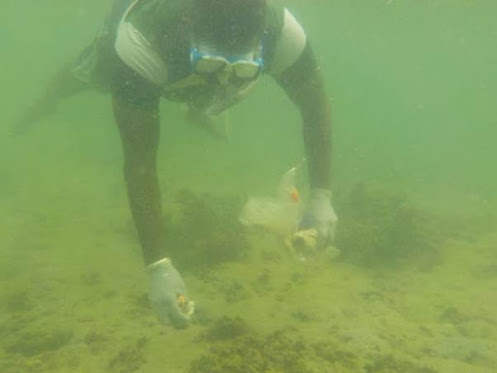Ghost Nets, Plastics Killing Rich Marine Life Of Palk Bay In Tamil Nadu, What Are We Doing To Save It?
Palk Bay (Tamil Nadu): Scuba Divers organised underwater clean-up in coral reefs and seagrass meadows to clear the plastic debris in the coral reefs in Tamil Nadu as part of LiFE movement.
15kg of ghost nets, single-use plastics and packaging was removed during an underwater clean-up along the Munaikadu, a coastal village located in the Palk Bay region of the state of Tamil Nadu. The clean-up was organised by Scuba Divers of the National Centre for Sustainable Coastal Management (NCSCM).
Palk Bay borders five coastal districts of Tamil Nadu between Kodiyakarai or Point Calimere in Nagapattinam district to Dhanushkodi in Ramanathapuram district. Its rich marine life is being killed by fishing nets and plastic. It is crucial to know what we are doing to save it.
Fishing nets lost in the ocean continue to kill fish for years
Earlier, fishing nets used to be made from rope. But since the 1960s, they are made from nylon, a material that is much stronger and cheaper. Nylon is plastic and it does not decompose. That means that fishing nets lost in the ocean, called ghost nets, continue to catch and kill fish for many years. Because of this, hundreds of millions of marine animals are killed or injured every year due to fishing nets pollution.
Ghost nets injure and kill marine animals. Marine mammals such as dolphins become entangled in discarded fishing nets choke and the fish that get caught starve to death.
This exercise by NCSCM in Tamil Nadu village was part of the Lifestyle for the Environment (LiFE) movement. Palk Bay is a shallow body of water that lies between the southeastern coast of India and the northern coast of Sri Lanka. It is a part of the larger Palk Strait, which connects the Bay of Bengal in the northeast with the Gulf of Mannar in the southwest.
Palk Bay supports a diverse range of marine life
Palk Bay is ecologically significant and supports a diverse range of marine life, including various species of fish, crustaceans, and sea turtles. The region is also known for its coral reefs and seagrass beds, which provide important habitats for marine organisms. The village is predominantly inhabited by fishermen who rely on the rich marine resources of Palk Bay for their livelihood. However, Palk Bay faces several environmental challenges in recent years, including marine litter.
Fishermen, boat owners joined clean-up drive
On the clean-up drive, NCSCM scientists went scuba diving in coral reefs and seagrass meadows to clear the plastic debris in the coral reefs. Along with the NCSCM team, fishermen, boat owners, and seaweed cultivators, including women, joined in the effort to remove marine debris from the ecologically sensitive seagrass and coral reef ecosystems. About 25 local fishermen participated in this event.
Seagrass beds are important marine habitats
This public outreach campaign was focused on improving ocean health through collective action by the local community. Seagrass beds are important marine habitats that provide shelter, food, and breeding grounds for numerous species. They also help stabilise the seafloor, improve water quality, and sequester carbon dioxide.
NCSCM staff sensitised the fishing community
Scuba divers involved in this seagrass and coral reef cleaning, removed marine debris, including plastic bags, fishing nets, and other litter, which can smother seagrass and corals, leading to their decline. As part of the awareness drive, NCSCM staff sensitised the fishing community on the need to live environmentally responsible lives and to conserve marine life and the marine environment. They agreed to practice ecologically friendly farming and responsible fishing after having gained an understanding of the Mission LiFE themes through this awareness event.
This event trained the fisherfolk in a comprehensive manner about their environment, biodiversity, habitat, and the need to live in harmony with nature. Placards and pamphlets were displayed on the beach as part of this event. NCSCM staff described Mission LiFE to the local fishing community.



